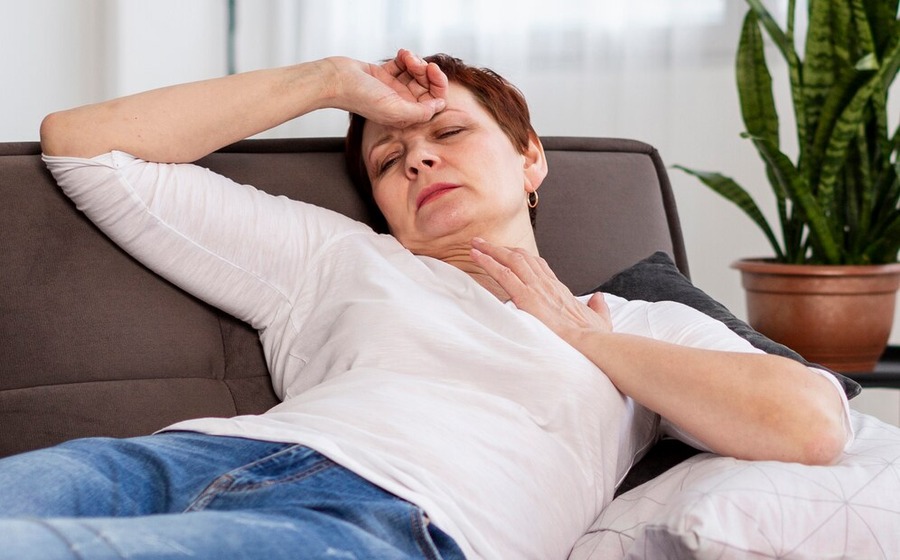
- December 19, 2023
Curious About Menopause: Your FAQs Answered
Menopause is a point in time in the health cycle that occurs in women when they pass a certain age and experience discontinuation in their regular menstrual cycle. It is considered to occur when an individual has no menstrual period for 12 consecutive months. The age of experiencing it can vary, however, it typically occurs in the late 40s or early 50s. It is a natural part of ageing and marks the end of Reproductive years.
Menopause starts late in life. It’s normal for the transition to start in midlife, but it can happen earlier or later. The time leading to Menopause is called “Perimenopause”.
Menopause Transition : It can begin 5 – 8 yrs before menopause when Ovaries produce less oestrogen. It usually starts at 40 yrs. Till Menopause, the point when Ovaries stop releasing eggs. In the last 1 or 2 years of Perimenopause the drop in oestrogen accelerates.
Symptoms could be Headache, Fatigue, Dry Mouth, Palpitation, Joint pains, GIT symptoms, Vaginal symptoms, Dementia, Increased risk of Heart disease, Diabetes and suffering emotionally.
Post Menopause (after one year) : During this period symptoms like Hot flushes may get better but women are at an increased risk of health conditions like Osteoporosis and Heart Disease.
Signs, Symptoms and Causes:
1. Hot Flushes – A sudden feeling of Intense heat, warmth and sweating lasting from few seconds to minutes.
2. Difficulty sleeping (Insomnia)
3. Emotional changes like irritability, mood swings, mild depression
4. Dry skin, dry eyes, dry mouth
5. Breast tenderness
6. Irregular periods that are heavy. Not everyone has same symptoms.
7. Some may experience – Racing heart, headache, joint and muscle aches and pain, change in libido, difficulty concentrating or memory lapse, weight gain, hair loss or thinning.
These symptoms are caused by hormone imbalances and can be treated with lifestyle changes, over-the-counter medications, and hormone therapy.
Myths:
Many people believe that the menopause experience is the same for everyone. Not everyone has the same symptoms or the same level of severity. Many believe that menopause only lasts for a short period of time while it can last for years in some cases.
Long term Health risks associated with menopause:
There are several conditions that one could be at a higher risk of, after menopause. The risk depends on many factors like family history, health before menopause and lifestyle factors.
Oestrogen protects the cardiovascular system, bones, brain, and vaginal and bladder tissues. This protection is lost after the menopause, increasing the risk of CVD (heart attack and stroke), osteoporosis, cognitive decline, and vaginal and bladder problems.
Osteoporosis
Osteoporosis is a “Brittle Bone disease” which occurs when the insides of bones become less dense, making them more fragile and likely to fracture. Oestrogen plays an Important role in preventing bone mass from breaking down. After the menopause, women lose about 1% of their bone density each year. This puts them at risk of fractures.
Bone Mineral Density testing also called bone densitometry is a quick way to see how much Calcium you have in certain parts of your bones. The test is used to detect Osteoporosis and Osteopenia (bone density is decreased) and this can be a precursor to Osteoporosis.
Cardiovascular Risk
Oestrogen protects the cardiovascular system (heart and blood vessels) during women’s reproductive years.
After menopause the risk for the coronary artery disease, heart attack and stroke increases in women because of several things, including:
• The loss of Oestrogen
• Increased blood pressure
• A decrease in physical activity
• Certain lifestyle habits like smoking, alcohol intake etc.
Additional Common Queries:
Does menopause affect Your teeth or mouth?
Yes, your teeth and gums are susceptible to the hormonal changes that occur during Menopause. This can lead to noticeable symptoms like dry mouth or Sensitive teeth and gums. This could increase your risk of developing cavities or gingivitis.
Dry Eyes
Facial Hair
Facial hair is one of the symptoms of the transition to menopause. This is because testosterone is relatively higher than Oestrogen.
Cognitive Decline is decrease in memory and thinking skills.
By Dr. Farzana Siddiqui
